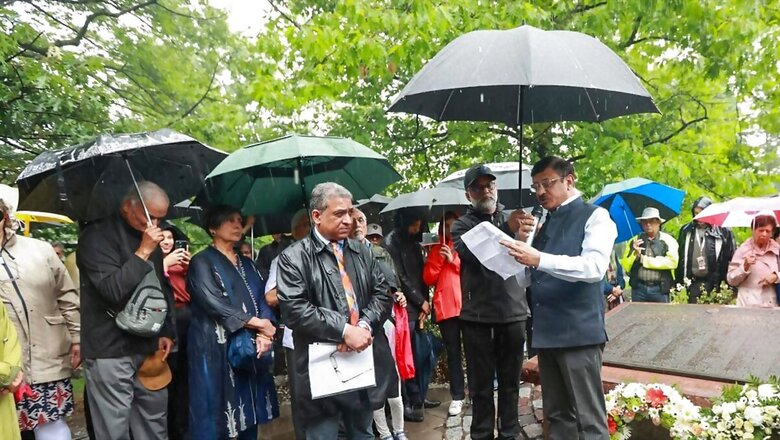
views
In August 2024, Liberal Party of Canada lawmaker Sukh Dhaliwal sponsored a petition in the country’s Parliament, reigniting debate on a contentious and painful chapter in Canadian history—the 1985 bombing of Air India Flight 182. The petition, spearheaded by Surrey journalist Gurpreet Singh and backed by Dhaliwal, pushed for a third probe into the bombing and suggested that Indian government agents may have been behind the attack.
This theory has been thoroughly debunked by the Canadian government in its past two investigations. Former Supreme Court judge in Canada, John C. Major, wrote in Air India Flight 182: A Canadian Tragedy that “the bombing was carried out by Sikh extremists as retaliation against the Indian government for Operation Blue Star,” effectively dismissing any notion that the Indian government itself was involved.
The move to revive this discredited narrative has sparked widespread concern, reopening wounds for victims’ families and stirring tensions within the Canadian and Indian communities. This article delves into the implications of the petition, examining potential consequences for historical integrity, public perception, social cohesion in Canada, and the broader threat posed by Khalistani terrorism in the West.
Background and Context
The Air India bombing on June 23, 1985, stands as a terrifying tragedy in Canadian history. The Montreal-New Delhi Air India ‘Kanishka’ Flight 182, exploded over the Atlantic Ocean, killing all 329 passengers and crew members. The majority of the victims were Canadian citizens of Indian descent. A second bomb, intended for another Air India flight, detonated prematurely at Narita Airport in Japan, killing two baggage handlers. The attack was immediately recognised as an act of terrorism. Subsequent investigations by Canadian authorities revealed that Khalistani terrorists residing in Canada were responsible.
There were two significant investigations into the bombing. The first, led by Justice John Major, concluded in 2010 and proved that the mastermind behind the attacks was Canadian citizen and Khalistani terrorist Talwinder Singh Parmar. The investigation exposed serious shortcomings within the Canadian security services, namely the Canadian Security Intelligence Service (CSIS) and the Royal Canadian Mounted Police (RCMP), who had been warned by the Indian government of the threat posed by Khalistani terrorist groups in Canada but failed to take appropriate action.
A second investigation, conducted in 2005 under the leadership of former Ontario premier Bob Rae, highlighted how Canadian authorities had allowed the attack to take place. Rae’s assessment confirmed Parmar’s involvement as the mastermind and described the attack as a “cascading series of errors” by Canadian authorities. Both investigations explicitly rejected the notion that Indian government operatives were involved, finding no credible evidence to support such allegations.
Despite these extensive investigations, some extremists, particularly those supporting the Khalistan movement for a separate sovereign Sikh state carved out of India, continue to indulge in conspiracy rhetoric, claiming that the Indian government was responsible for the bombing.
When Indian spies were allegedly implicated in the assassination of Khalistani terrorist Hardeep Singh Nijjar in Surrey, British Columbia, in September 2023, Canadian Prime Minister Justin Trudeau reignited attention to this theory. The petition led by lawmaker Dhaliwal was prompted by this assertion, serving as an excuse for the revival of the debunked conspiracy surrounding the bombing of the Air India aircraft.
Analysis of the Petition’s Implications
The sponsorship of this petition by political leaders, initiated by Sukh Dhaliwal, a Member of Parliament, raises serious concerns about their commitment to social peace and historical accuracy. Though Dhaliwal claimed that supporting the petition does not necessarily imply agreement with it, this could be smart wordplay. It fails to clarify Dhaliwal’s position, despite his efforts in gathering over 400 supporters’ signatures for the petition. This move may have far-reaching effects on Canadian society as a whole, as well as on the families of the victims.
The petition raises significant concerns about the potential distortion of facts relating to Canadian history, which is one of the primary worries for the victims’ families.
Rigorous research and substantial evidence support the findings of the Major and Rae investigations. Contesting these conclusions without presenting new evidence risks undermining the Canadian legal system’s reputation and public trust in established facts. Moreover, for younger generations unfamiliar with the specifics of the Air India bombing, the spread of disproven ideas might result in a skewed perception of these horrific events.
There are emerging conflicts within the Canadian community as a result of the petition. The proposed Khalistan state continues to be a divisive issue. While the majority of Sikhs in Canada do not support the Khalistani movement, a small segment does. The sponsorship of this petition by a prominent Sikh MP could deepen existing divisions and increase mistrust and animosity within the Indo-Canadian community. In a multicultural nation like Canada, where social cohesion depends on respect and understanding between diverse cultures, this is highly concerning.
For the victims’ families, the petition also has the potential to reopen old wounds. These families have been grappling with the pain of losing loved ones to terrorism for nearly forty years. The conclusions of the Major and Rae inquiries provided a measure of closure, affirming that justice had been served and the truth uncovered. This hard-won peace could be jeopardised by a resurgence of debunked theories, forcing the relatives of the victims to revisit their grief and face the unsettling reality that their loss may be used for political gain.
The families of the victims have reacted strongly against the petition. According to reports, Deepak Khandelwal, who lost both of his sisters in the bombing, has expressed his opposition, labelling the petition as ‘hurtful’ and accusing its creators of trying to ‘rewrite history’ and ‘promote hatred.’ Similarly, Bal Gupta, whose wife Rama was also killed in the attack, denounced the petition as ‘garbage’ and an attempt to garner attention and support for terrorist actions. These voices highlight the intense anguish and frustration the petition has caused among those directly affected by the bombing.
Impact on Public Perception
Promoting disproved conspiracy theories can significantly affect public opinion, particularly in a culture where misinformation and false narratives are increasingly pervasive. It is essential to understand the tragic and complex historical context of the Air India bombing, but by emphasising debunked theories, the petition risks overshadowing the facts, confusing the public, and leading them astray.
This is especially concerning given that the majority of Canada’s younger generation either know little or nothing about the Air India bombing. In such a situation, false narratives could fill the void left by a lack of public knowledge, resulting in a distorted and incorrect understanding of one of Canada’s most heinous tragedies. The government’s response to this petition will be crucial in upholding the integrity of the facts and shaping public opinion.
The Air India bombing was not only a tragedy for the victims and their families but also a stark reminder of the dangers of extremism, terrorism, and the importance of vigilance in safeguarding national security. A sitting MP sponsoring this petition risks giving the impression that the Canadian government is not fully committed to addressing these threats, which could undermine public trust in its institutions and leaders.
Moreover, the petition has the potential to significantly impact Canada-India relations. In recent years, tensions have arisen between the two nations, particularly regarding Khalistani extremism. The resurgence of debunked theories surrounding the Air India bombing could further strain diplomatic ties, potentially leading to hostilities and hindering cooperation on crucial issues such as immigration, trade, and security.
The petition poses a threat to historical accuracy, forcing the families of victims to relive past trauma and exacerbating social tensions in Canada. In response, the Canadian government must firmly reject the promotion of these disproven conspiracy theories and reaffirm its commitment to the conclusions drawn by the Major and Rae investigations.
The Canadian government should consider launching a public awareness campaign on the Air India bombing to uphold historical accuracy and curtail the spread of disinformation. This initiative could include educational programs in schools, public memorials for the victims, and other activities that ensure Canadians remember and fully understand the tragic incident.
It is imperative that the government hold discussions with the community highlighting the significance of harmony and reciprocal regard within a diverse society. By addressing concerns from all sides, the government can help heal divisions caused by the petition and reinforce Canada’s social unity.
By taking such steps, Canada would reaffirm its commitment to social cohesion, justice, and truth, while also paying tribute to the victims of the Air India bombing and offering support to their families.
The Canadian government should also explore the possibility of ‘external state and non-state actors’ attempting to sow discord within its society by promoting divisive issues. Is there an attempt to derail the long-standing Indo-Canadian relations? A reassessment of the government’s approach to extremism, terrorism, and violent groups, particularly those linked to Khalistani extremism, may be necessary. Furthermore, all stakeholders must unite to reject the exploitation of this tragic event as a ‘political tool’.
The author is content manager at Centre for Integrated and Holistic Studies. Views expressed in the above piece are personal and solely those of the author. They do not necessarily reflect News18’s views.




















Comments
0 comment